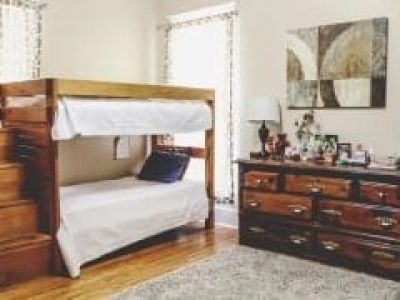How Much Do Sober Living Homes Cost in Tennessee?
Addiction recovery and maintaining sobriety can be challenging. After an inpatient rehabilitation stay, living in a sober living home can help support your journey. Freeman Recovery Center has multiple rehab facilities in Tennessee that can support your addiction treatment and help create an aftercare program that meets your needs.
Freeman Recovery Center facilities offer treatment for people who are struggling with substance abuse, addiction, mental health conditions, and dual diagnosis. Dual diagnosis is a condition in which a person has addiction and a co-occurring mental health condition. While these are two separate diagnoses, they must be treated simultaneously to improve the potential for success.
Drug and Alcohol Addiction and Sober Living Statistics in Tennessee
There is a growing drug and alcohol addiction problem throughout the US, and Tennessee is not different. Substance abuse affects the entire family. Data has shown that families with an alcohol use disorder have a 48.3% risk of divorce, which is far higher than people without an alcohol use disorder. Studies have also shown that when people have to wait for treatment they are less likely to complete a program.
Even just two weeks in an intensive outpatient program has shown to be clinically effective and reduces self-reported symptoms. While treatment is crucial, a lack of a stable, drug-free environment is a serious barrier to sustaining recovery. Data show that sober living transitional housing reduce arrests and psychiatric symptoms while improving drug and alcohol use and employment. The TN Department of Mental health and Substance abuse Services supports sober living homes by creating permanent recovery housing opportunities across the state. The Tennessee Housing Development Agency also takes part in supporting sober living situations for people who are struggling with addiction and mental health conditions.

Book a Free Assessment
Contact us to schedule a free addiction or mental health assessment as part of our admissions process.
Check Your Insurance Coverage
What is the Difference Between Sober Living Homes and Rehab in TN?
There is a difference between rehab and sober living in Tennessee. A sober living home is a residential facility where people who are recovering from substance addiction can live. Most sober living homes do not define the type of substance and accept people who are in recovery from addiction to drugs or alcohol.
Unlike inpatient care treatment centers, a sober living home does not provide clinical treatment. Instead, it is a supportive and structured environment where people can live as they transition to a more independent lifestyle after completing an inpatient rehab program. The homes enforce a substance free environment and typically require residents to adhere to specific rules.
For example, residents must have regular employment, attend recovery meetings, and participate in household chores. The primary goal is to facilitate the recovery process by encouraging personal responsibility, the development of social support networks, and coping skills that are necessary to maintain long-term sobriety. Sober living transitional housing is an intermediate step between an inpatient or residential treatment program and return to everyday life.
Check Your Insurance Coverage for Sober Living Treatment Options

What is the Difference Between a Sober Living and a Halfway Homes?
There are similarities and differences between a sober living home and halfway house. Both are residential facilities that help support a person in recovery, but they have different purposes, structures, and regulatory oversight. Sober living homes are primarily designed to provide a supportive and structured drug and alcohol-free environment for people who are committed to maintaining sobriety.
Residents typically have more freedom than in a halfway house. While residents may not be required to participate in a treatment program, they are encouraged to attend support group meetings. Sober living homes are typically funded by the residents. By comparison, halfway houses are transitional living arrangements for people who are recently released from prison or who are going through a court ordered rehabilitation program. They provide support for recovering addicts but typically have stricter rules about participation in treatment programs. Halfway house costs are often funded and regulated by government agencies, which can influence their operation and level of supervision.
Is there a Difference Between Addiction Treatment and Sober Living?
There is a significant difference between addiction treatment and sober living in Tennessee. Addiction treatment facilities typically offer a structured program that includes clinical services, medical detoxification, counseling, and therapy. These are aimed at addressing the root cause of addiction and promoting recovery. The services can be offered in an inpatient or residential setting.
They also include outpatient programs such as partial hospitalization programs (PHP) and intensive outpatient programs (IOP). By contrast, sober living homes provide a substance free environment in the community for people who are in recovery. The homes do not offer clinical treatment services but focus on creating a supportive and structured community where residents can learn to rebuild their lives and ease their transition back into everyday life. Residents are typically expected to engage in daily responsibilities, adhere to house rules, and participate in peer support meetings. Residents of sober living communities can attend outpatient programs to continue treatment.
Is Sober Living After Drug & Alcohol Addiction Treatment a Good Idea?
Sober living homes for individuals who have completed an addiction treatment program is widely considered a beneficial step. People who live in a stable, drug-free environment, have fewer arrests, are gainfully employed, and have a lower risk of drug and alcohol use. The Tennessee Department of Mental health and Substance abuse Services and Tennessee Housing Development Agency support sober living homes because they work.
This housing environment bridges the gap between a residential or inpatient treatment program and the challenges of returning to everyday life. Within a substance-free living space, people have access to peer support and a sense of community that is crucial to maintain sobriety. Sober living homes help people develop healthy habits, accountability, and life skills that support long-term and sustainable recovery.
Why do Sober Living Housing for Drug & Alcohol Addiction Have Price Variations in Tennessee?
As you consider the cost of sober living, you may have noticed differences in prices between sober living homes in Tennessee. These price variations are often due to several factors. The geographical location of a sober living home plays a significant role in cost. For example, homes that are located in areas with higher cost of living typically charge more than those located in rural areas.
Sober living homes that offer high-end amenities also charge more. For example, homes with luxurious accommodations or on-site fitness facilities can command a higher fee. The size of the facility and the staff-to-resident ratio also influences cost. When people receive more personalized care or there’s a lower resident capacity, it often means higher treatment expenses. The final factor is the funding model – whether it’s privately operated or receives subsidies. This also impacts the price structure of a sober living home.
What is the Average Cost of Sober Living Homes for Alcohol Addiction in Tennessee?
When a sober living home is part of the aftercare plan following inpatient or residential treatment at Freeman Substance Abuse Recovery Center, we may be asked how much does sober living cost in Tennessee. This cost can vary depending on factors such as location, amenities, the level of staff support provided, and how the home is funded.
Prices can range from $500 to $2000 per month for a single room. These do not include outpatient programs such as partial hospitalization program (PHP) costs or intensive outpatient program (IOP) costs. Knowing the detailed pricing information and what’s included in the cost can help you and your family make informed decisions based on your needs and your financial situation.
What is Average Cost of Sober Living Homes for Drug Addiction in TN?
Most sober living homes offer residential support for people in recovery from drugs and alcohol addiction. The primary consideration is a person’s commitment to sobriety. The cost of a sober living house for drug addiction in Tennessee depends on many of the same factors as the cost for alcohol addiction, including location, level of staff support, amenities, and whether the home is subsidized.
Prices can range from $500 to $2,000 per month or higher for a single room. This sometimes includes meals in luxury settings and at other times residents are expected to be gainfully employed, go grocery shopping, and cook for themselves. This approach encourages mutual community support and shared experiences among the residents who are recovering from substance abuse.
How Much Does a Drug and Alcohol Sober Living Rehab Program Cost?
The cost of a rehab sober living program in Tennessee ranges from several hundred to several thousand per month. Sober living homes that are affiliated with nearby rehabilitation centers and treatment centers may offer residents access to rehab services, including therapy and counseling.
Treatment may occur on-site or through partnerships with treatment providers. This situation can help ease the transition into the community and potentially lower substance abuse treatment expenses for the individual. The cost of a sober living program that offers rehabilitation is typically higher than a sober living home without these services. The facility aims to bridge the gap between an intensive inpatient setting and the independence of living within the community.

What Things to Look for in a Sober Living Rehab Facility in Tennessee
When you’re looking for a sober living facility in Tennessee, there are several questions that should be answered, and aftercare costs is just one. The following is a list of characteristics that you should look for in a sober living facility. However, this is not a full list. For more information and assistance in finding a living environment that works for you, we encourage you to call Freeman Addiction Recovery Center at (615) 645-3677. Our admission counselors can answer your questions about treatment and an aftercare plan that works for you.
Program Options Personalization
Sober living homes may offer a more personalized approach that is tailored to your recovery journey. This can focus on specific goals, personal challenges, or needs. This customization can help a person adapt to a sober lifestyle and address unique aspects of their recovery process.
Employment Assistance Programs
Many sober living homes provide employment assistance programs (EAPs) to help residents find stable jobs. Gainful employment helps support recovery. These programs can include resume building, job search support, and interview preparation. This facilitates a smoother transition into the workforce while supporting financial independence during recovery.
Educational Opportunity Support
Supporting educational opportunities is crucial for a person who wants to continue or return to their studies. Some sober living homes offer tutoring, access to educational resources, and guidance in enrolling in courses or programs. This helps you to advance your education while in recovery.
Vocational Opportunity Support
Vocational support focuses on your career development and skill acquisition. Sober living homes that offer these opportunities typically include training, certification programs, and hands-on workshops. This support helps you to develop new skills or improve existing ones. This increases your employability and your confidence in a professional setting.
Alumni Programs Near Me
As you consider sober living homes, look at alumni programs that foster a sense of community and ongoing support among former residents. This offers you a network of individuals who can offer encouragement, social opportunities, and relapse prevention strategies. This helps you to maintain a connection and access to resources after transitioning into daily life.
Aftercare Support Near Me
Local aftercare support services also ensure continued access to counseling, support group meetings, and other resources that are necessary for you to maintain sustainable sobriety. Proximity to these resources and services is crucial to facilitate consistent participation and to support long-term sustainable recovery.
Rehab Center in Tennessee That Offers Payment Plans for Sober Living
Freeman Addiction Recovery Center offers gender specific sober living environments for men and women where you can continue your journey to recovery. Our facilities have multiple programs and multiple payment options that can help reduce your financial burden with insurance coverage. With access to continued outpatient rehab, 12-step programs, and a supportive and encouraging community, sober living housing is a unique and highly beneficial program that offers accountability as you work toward complete independence.
Detox/Residential Inpatient facility: 1615 HWY 96, Burns, TN 37029
Hours of Operation: 24/7
PHP/IOP/OP Facility: 222 State St, Dickson, TN 37055
Hours of Operation: Monday – Friday, 8am – 9pm
Admin/Admissions Office: 250 State St, Dickson, TN 37055
Hours of Operation: Monday – Friday, 8am – 5pm

Costs of Skipping Sober Living Rehab in the Addiction Treatment Process
Our discharge planners are usually asked how much do sober living homes cost, but the cost of not utilizing these services should also be considered. As research has shown, sober living homes offer a structured and supportive housing that helps reduce drug and alcohol use, improve employability, reduce mental health symptoms, and reduce arrests.
The cost of skipping this part of addiction recovery may increase your risk of relapse and increase your financial and relational costs. Individuals with active addiction have a higher rate of divorce than do those without. Divorce, lack of employability, and difficulties with the legal system can have a significant influence on your financial health for decades.
What Health Insurance Covers Sober Living Treatment in Tennessee?
Yes, health insurance does offer some coverage level for sober living in Middle Tennessee. There are two federal laws that protect your rights to mental health and substance use disorder treatment. These are the 2008 Mental health Parity and Addiction Equity Act and the 2010 Affordable Care Act. However, while these laws protect you, your insurance provider defines your benefits and limits.
Your out-of-pocket treatment expenses for sober living are influenced by your insurance policies deductible, co-pays, benefits, and exclusions. The best way to understand your insurance coverage levels is to call Freeman Alcohol and Drug Addiction Center at (615) 645-3677 or contact us online. Our admission counselors are adept at working with insurance providers, verifying your insurance coverage for rehab, and discussing your alternative financial options, such as a payment plan that can help reduce your financial burden.
How To Pay for Sober Living Services at Freeman Recovery Center in TN
There are a variety of ways to help pay for sober living services in Middle Tennessee. The admission counselors at Freeman Drug and Alcohol Addiction Center are interested in helping you receive the care that you need. Part of getting the help you need is being able to pay for it.
When you are looking for a sober living house, consider a search for “low cost sober living near me” in your favorite search engine. While cost is a significant factor, it’s also important to find a sober living environment where you’re comfortable, feel supported, and have access to the resources you need. The sober living housing options at Freeman Substance abuse Recovery Center facilities offer you options for continuing access to outpatient care, 12-step support programs, and a structured environment that eases the transition into everyday life.
Addiction and Sober living Statistics in the Volunteer State
- Substance abuse affects the entire family. Data show those with an alcohol use disorder had a 3% risk of divorce. This is far higher than a group of people without an alcohol use disorder.
- Studies have demonstrated that when people have to wait for treatment, they are less likely to complete a program.
- Preliminary results of the clinical effectiveness of an IOP found that even just a two week program could reduce self-reported symptoms and increased satisfaction with participation in their social network.
- Lack of a stable, drug-free environment is a serious barrier to sustainable recovery. Sober living houses improve drug and alcohol use and employment, while reducing arrests and psychiatric symptoms.
- The TN Department of Mental health and Substance abuse Services supports the availability of safe, stable, quality, affordable housing as a component of recovery.
- The TN Department of Mental health and Substance abuse Services creates and supports permanent recovery housing opportunities across the state and maintains a list of permanent housing options supported by community agencies, grants, and residents.
- The Tennessee Housing Development Agency also takes part in supporting sober living situations for individuals struggling with addiction and mental health
Connect With Us For An Assessment Today




